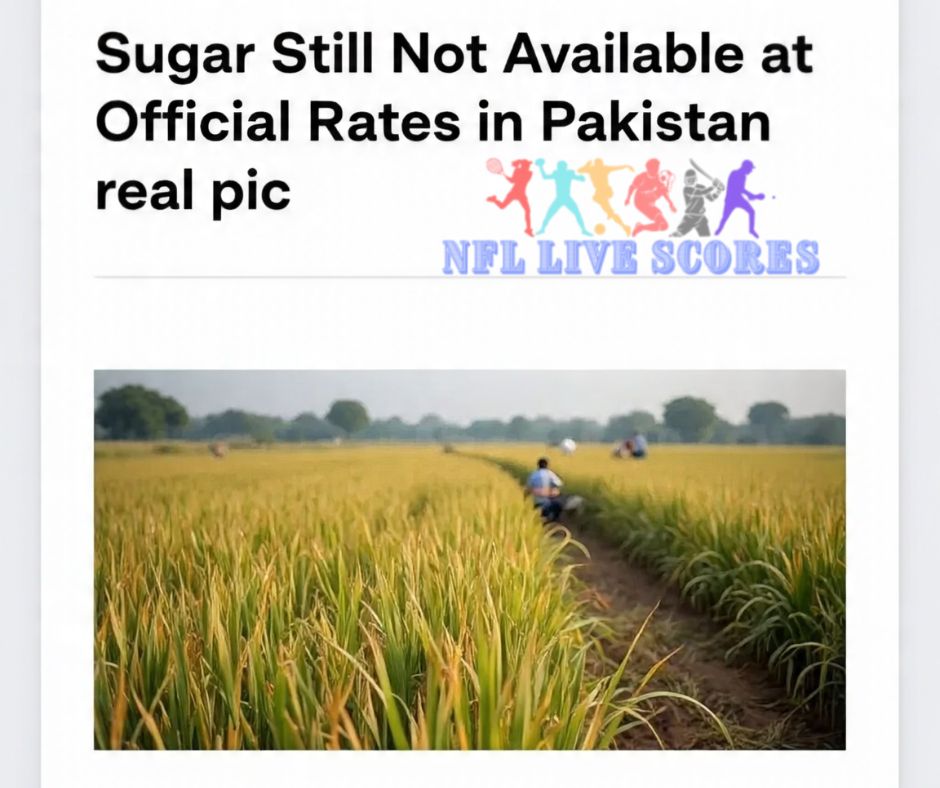Author: Haseeb | Source: NFL LIVE SCORES
Website: NFLlivescores.com
Sugar Still Not Available
In Pakistan, sugar—a staple in every household—remains unavailable at official rates despite repeated government crackdowns and public promises. While authorities claim to be taking action against hoarders and profiteers, ground realities tell a different story. Citizens across the country are facing inflated prices, empty utility store shelves, and a growing frustration over the government’s inability to control the sugar mafia.
A Crisis Beyond Control
Over the past several months, both federal and provincial governments have taken multiple measures to curb sugar hoarding and price manipulation. Raids have been conducted, mills have been sealed, and fines imposed. Yet, sugar prices remain stubbornly high in open markets—ranging between Rs. 160 to Rs. The government’s set pricing of Rs. 140 per kilogram is much lower at Rs. 180.
Residents in cities like Lahore, Karachi, and Peshawar report standing in long queues outside government-run utility stores, only to return empty-handed. Many complain that even when sugar is available at these outlets, rationing limits them to purchasing just 1 or 2 kilograms—insufficient for larger families.
Sugar Mafia Still Reigns
Experts believe the root of the problem lies in the unchecked power of the sugar cartel—commonly referred to as the “sugar mafia.” These influential groups control supply chains, manipulate stocks, and push prices up to maximize profits. Several political families own sugar mills, raising concerns about conflict of interest and lack of accountability.
An investigative report by NFL LIVE SCORES reveals that while mill owners claim low production due to rising input costs, warehouse inspections have found thousands of tons of sugar hoarded away, waiting to be sold at inflated prices once the market tightens.
Consumer Woes Continue
For everyday consumers, especially daily wage earners and middle-class families, this price hike has turned sugar into a luxury item. “How can we afford sugar when our monthly income hardly covers basic groceries?” asks Amna, a mother of three standing outside a utility store in Rawalpindi. “We hear on the news that action is being taken, but we don’t see the result in our kitchens.”
In the meanwhile, tiny restaurants, tea stall sellers, and bakeries have raised their rates as well, putting the cost on customers. The effects ripple across the economy, making this not just a sugar issue—but a broader inflationary concern.
Government’s Repeated Failures
Despite multiple claims from ministers and food authorities, effective regulation remains missing. The Competition Commission of Pakistan (CCP) has conducted inquiries, and recommendations have been made, but without political will and proper enforcement, these remain ineffective.
The government’s subsidy schemes have also failed to meet expectations. Utility stores run out of subsidized sugar within hours of restocking. Black marketing, where subsidized sugar is resold at higher rates, continues unchecked.
A Call for Transparency and Reform
Pakistan’s sugar crisis is more than a supply-demand imbalance—it’s a governance challenge. Transparency in mill operations, strict anti-hoarding laws, and depoliticizing the sugar industry are critical to resolving the issue.
Until then, consumers will continue to suffer the consequences of weak enforcement and elite control over essential commodities.
Final Thought
Despite the so-called crackdown, sugar in Pakistan is still far from being sold at official rates. The failure to tame the sugar mafia, enforce effective regulation, and ensure fair market distribution has exposed deep cracks in the country’s economic management. Unless structural reforms are implemented, the common man will continue to pay the price—literally and figuratively.
📍 Verified by NFL LIVE SCORES
📲 Facebook: NFL LIVE SCORES
📸 TikTok: @Nfllivescores
🌐 Website: Nfllivescores.com
✍️ Written by: Haseeb

